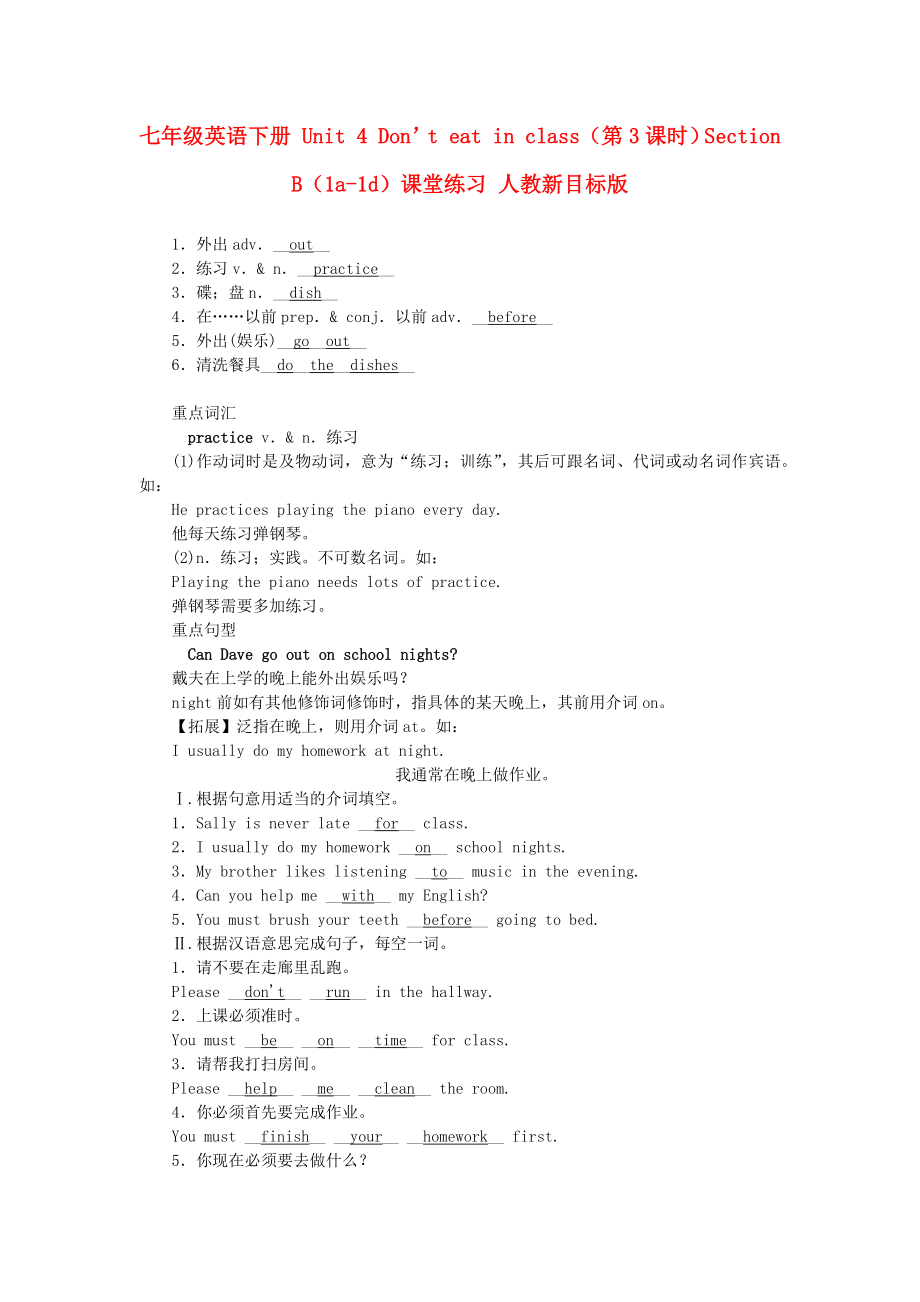《七年級(jí)英語下冊(cè) Unit 4 Don’t eat in class(第3課時(shí))Section B(1a-1d)課堂練習(xí) 人教新目標(biāo)版》由會(huì)員分享�,可在線閱讀,更多相關(guān)《七年級(jí)英語下冊(cè) Unit 4 Don’t eat in class(第3課時(shí))Section B(1a-1d)課堂練習(xí) 人教新目標(biāo)版(3頁(yè)珍藏版)》請(qǐng)?jiān)谘b配圖網(wǎng)上搜索�。
1、七年級(jí)英語下冊(cè) Unit 4 Don’t eat in class(第3課時(shí))Section B(1a-1d)課堂練習(xí) 人教新目標(biāo)版
1.外出adv.__out__
2.練習(xí)v.& n.__practice__
3.碟���;盤n.__dish__
4.在……以前prep.& conj.以前adv.__before__
5.外出(娛樂)__go__out__
6.清洗餐具_(dá)_do__the__dishes__
重點(diǎn)詞匯
practice v.& n.練習(xí)
(1)作動(dòng)詞時(shí)是及物動(dòng)詞��,意為“練習(xí)����;訓(xùn)練”,其后可跟名詞��、代詞或動(dòng)名詞作賓語���。如:
He practices pl
2����、aying the piano every day.
他每天練習(xí)彈鋼琴�。
(2)n.練習(xí);實(shí)踐���。不可數(shù)名詞��。如:
Playing the piano needs lots of practice.
彈鋼琴需要多加練習(xí)����。
重點(diǎn)句型
Can Dave go out on school nights?
戴夫在上學(xué)的晚上能外出娛樂嗎?
night前如有其他修飾詞修飾時(shí)�,指具體的某天晚上,其前用介詞on����。
【拓展】泛指在晚上,則用介詞at��。如:
I usually do my homework at night.
我通常在晚上做作業(yè)����。
Ⅰ.根據(jù)句意用適當(dāng)?shù)慕樵~填空。
1.Sa
3�、lly is never late __for__ class.
2.I usually do my homework __on__ school nights.
3.My brother likes listening __to__ music in the evening.
4.Can you help me __with__ my English?
5.You must brush your teeth __before__ going to bed.
Ⅱ.根據(jù)漢語意思完成句子,每空一詞�。
1.請(qǐng)不要在走廊里亂跑。
Please __don't__ __run__ in t
4��、he hallway.
2.上課必須準(zhǔn)時(shí)�。
You must __be__ __on__ __time__ for class.
3.請(qǐng)幫我打掃房間�����。
Please __help__ __me__ __clean__ the room.
4.你必須首先要完成作業(yè)�。
You must __finish__ __your__ __homework__ first.
5.你現(xiàn)在必須要去做什么?
What do you __have__ __to__ do now?
Ⅲ.按要求完成下列句子,每空一詞��。
1.Nick has to practice the piano every d
5��、ay.(改為一般疑問句)
__Does__ Nick __have__ __to__ practice the piano every day?
2.Does Li Qiang have to eat lunch at school�����?(作肯定回答)
__Yes__����,he __does__.
3.Can he go out to see friends on school nights?(作否定回答)
No�����,__he__ __can't__.
4.Tell me a story after dinner.(改為否定句)
__Don't__ __tell__ me a story a
6�、fter dinner.
5.Maria gets to school early every day.(改為同義句)
Maria __arrives__ __at__ school early every day.
Ⅳ.單項(xiàng)選擇。
(B)1.—Look! There are so many people in the park.
—Nobody likes to stay at home ________ Sunday morning.
A.in B.on
C.a(chǎn)t D.to
(C)2.I often ________ TV ________ the evening.
7�、A.see; in B.see; on
C.watch; in D.watch; on
(A)3.—________ Bob have to ________ a uniform at school?
—Yes,he does.
A.Does; wear
B.Does; wears
C.Do; wear
D.Do; wears
(D)4.________ make any noises.Your sister is preparing(準(zhǔn)備) for exams.
A.Do B.Please
C.To D.Don't
(D)5.The teacher te
8�、lls us to practice ________English more.
A.speak B.to speak
C.talking D.speaking
Ⅴ.完形填空。
My name is Eric.I'm busy every day.I __1__ to get up at 6:00 in the morning.At 6:30�,I have __2__.Then I walk to school at 7:00.I must __3__ at school at 7:30.
I have six classes every day.The __4__ clas
9、s begins at 8:00 a.m.I like history and English very much.I think they are very __5__.The math is difficult����,but I have to __6__ it every day.Sometimes I must clean the classroom after school in the afternoon.I want to play basketball after school����,__7__ I can't.Because I have to get home __8__ 5:00 p
10��、.m.
I have to help my mother do the dishes after dinner.I want to watch TV after dinner�,but I can't.I have to play __9__.I don't like these rules.I __10__ they are terrible.
(B)1.A.has B.have
C.must D.can
(C)2.A.a breakfast B.the breakfast
C.breakfast D.lunch
(A)3.A.arrive B.get
C.reach
11、 D.go
(D)4.A.one B.last
C.sixth D.first
(A)5.A.interesting B.difficult
C.terrible D.boring
(D)6.A.learning B.learns
C.to learn D.learn
(C)7.A.and B.or
C.but D.so
(A)8.A.before B.a(chǎn)fter
C.on D.in
(B)9.A.piano B.the piano
C.a(chǎn) piano D.pianos
(C)10.A.like B.want
C.think D.need
 七年級(jí)英語下冊(cè) Unit 4 Don’t eat in class(第3課時(shí))Section B(1a-1d)課堂練習(xí) 人教新目標(biāo)版
七年級(jí)英語下冊(cè) Unit 4 Don’t eat in class(第3課時(shí))Section B(1a-1d)課堂練習(xí) 人教新目標(biāo)版

